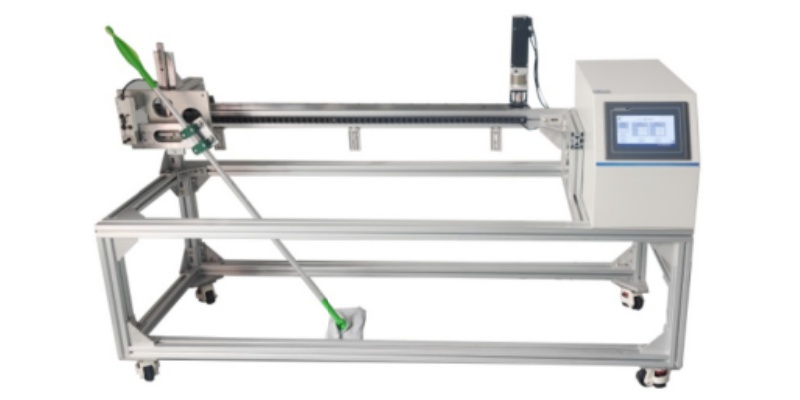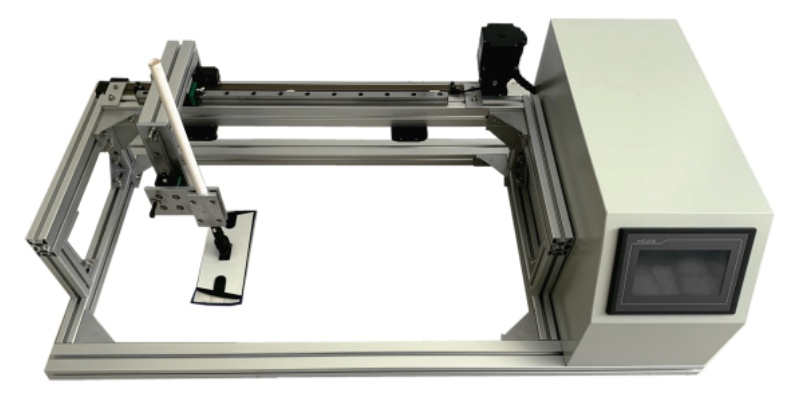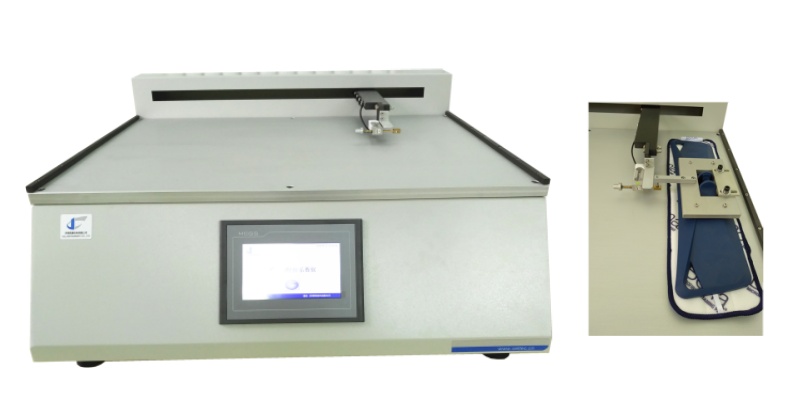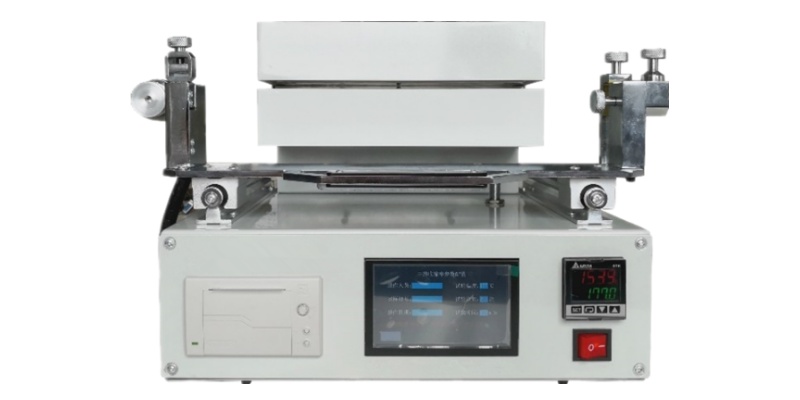Vetovoiman testauskone
Mopin laadun testaus
- Vetolujuuden testaus
Vetotestauskone on elintärkeä väline, jota käytetään materiaalien mekaanisten ominaisuuksien arvioimiseen käyttämällä hallittua vetovoimaa (venytysvoimaa), kunnes vika ilmenee. Tämä kone on suunniteltu tarjoamaan tarkat tiedot siitä, kuinka materiaalit, kuten mopin kahvat, kuidut ja liimauskomponentit, toimivat mekaanisessa rasituksessa. Asian yhteydessä mopin laadun testaus, vetotestauskone auttaa valmistajia arvioimaan tärkeimpien mopin osien lujuutta ja kestävyyttä.
Kuinka vetokoekone toimii
Vetotestauskone toimii kohdistamalla venytysvoimaa näytemateriaaliin samalla, kun se mittaa sen vetokestävyyttä. Koneen punnituskenno tallentaa kohdistetun voiman määrän, kun taas näytteen venymistä (venymistä) seurataan. Testiä jatketaan, kunnes materiaali rikkoutuu, repeytyy tai epäonnistuu muulla tavalla.
sisään mopin laadun testaus, tätä prosessia käytetään useiden keskeisten näkökohtien arvioimiseen:
- Vetolujuuden testaus: Tämä testi mittaa enimmäisvoiman, jonka materiaali voi kestää ennen kuin se rikkoutuu. Moppimateriaalit, kuten mopin pään tai kahvan materiaalit, käyvät läpi tämän testin sen määrittämiseksi, kuinka paljon jännitystä ne kestävät käytön aikana.
- Repäisylujuustesti: Tämä testi määrittää voiman, joka tarvitaan repeämän leviämiseen, kun materiaali on alkanut halkeilla. Mopeissa repäisylujuus on tärkeä kuitujen ja kankaiden kestävyyden arvioimiseksi jokapäiväisessä rasituksessa, kuten vetämisessä tai vääntymisessä.
- Murtovoiman testaus: Tämä on samanlainen kuin vetolujuustestaus, mutta keskittyy kohtaan, jossa materiaali hajoaa kokonaan voiman vaikutuksesta, mikä auttaa valmistajia ymmärtämään materiaalin kestämän enimmäiskuorman.
- 3-pisteen taivutustestaus (Mopin kahvan testaus): Sekä muovi- että metallimopin kahvojen vetotestauskone voi simuloida taivutusvoimia, joita ne kokevat jokapäiväisessä käytössä. Kolmen pisteen taivutuskoe mittaa kahvan kykyä vastustaa murtumista tai taipumista paineen alaisena.
Vetotestauskoneen pääparametri
| Testialue | 0-500N (tai 50N, 100N, 200N jne.) |
| Aivohalvaus | 800mm (muokattavissa muille iskuille) |
| Testinopeus | 1-500mm/min |
| Siirtymätarkkuus | 0,01 mm |
| Tarkkuus | 0.5% täysi mittakaava |
| Näytteen leveys | 27 mm (valinnainen leveys saatavilla) |
| Ohjaus | PLC ja HMI-näyttö |
| Tietojen ulostulo | Mikrotulostin (valinnainen), RS232 (valinnainen) |
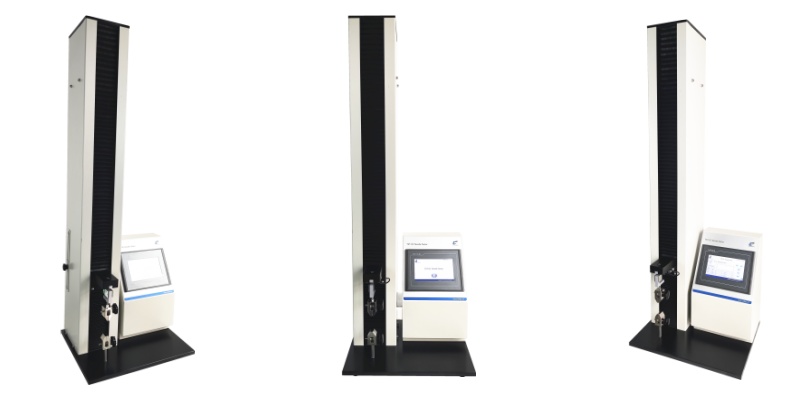
Mopin laadun testausratkaisu
Moppien laadun ja kestävyyden varmistaminen on välttämätöntä sekä kaupallisissa että kotitalouksissa. A mopin laadun testausratkaisu Vetotestauskonetta hyödyntävä mopin osat ovat vahvoja, luotettavia ja kestävät rasitusta ilman ennenaikaista vikaa.
Tämä ratkaisu keskittyy moppitestauksen useisiin näkökohtiin:
-
Mopin osien tarttumislujuus: Vetotestauskone arvioi kuinka hyvin mopin eri osat, kuten kuidut ja kahvat, ovat kiinnittyneet toisiinsa. Vahva sidos on ratkaisevan tärkeää, jotta kuidut eivät irtoa mopin päästä käytön aikana.
-
Moppimateriaalien mekaaninen lujuus: Kone arvioi mopin osien yleiset mekaaniset ominaisuudet, mukaan lukien kuidut, kahva sekä kahvan ja mopin pään välinen liitin. Tämä on tärkeää mopin kimmoisuuden ja pitkäikäisyyden arvioimiseksi.
Vetotestauskoneen tärkeimmät ominaisuudet
The Vetovoiman testauskone tarjoaa useita etuja moppivalmistajille
Tarkkuus ja tarkkuus
Kone tarjoaa erittäin tarkat vetolujuuden, venymän, repäisylujuuden ja murtolujuuden lukemat, joten se soveltuu laadunvalvontaan ja tutkimukseen.
Käyttäjäystävällinen käyttöliittymä
Intuitiivisen käyttöliittymän ansiosta vetokoestuskonetta on helppo käyttää myös henkilökunnalle, jolla on vähän kokemusta materiaalien testauksesta.
Laaja valikoima testejä
Kone tukee monenlaisia moppikomponenttien testejä moppikuitujen vetolujuuden testaamisesta mopin kahvojen joustavuuden arviointiin.
Kehittynyt kuormituskennotekniikka
Punnituskenno tarjoaa johdonmukaisia ja luotettavia tietoja mittaamalla kohdistetun voiman ja tallentamalla sen tarkasti, mikä varmistaa, että testitulokset ovat toistettavissa.
Testin prosessi ja merkitys
Moppimateriaalien vetotestien suorittamisprosessi sisältää seuraavat vaiheet:
-
Näytteen valmistus: Näytteet mopin osista (kahva, kuitu tai sidemateriaali) valmistetaan määritettyjen mittojen mukaan.
-
Testiasetukset: Näyte asetetaan lujasti vetokoekoneeseen. Mopin kahvoihin, sekä muoviin että metalliin, kone kohdistaa voiman tietyllä nopeudella, simuloiden voimia, joita kahva kokee käytön aikana.
-
Testin suoritus: Kone käyttää jatkuvasti kasvavaa voimaa, kunnes materiaali vääntyy, repeytyy tai murtuu. Tämän prosessin aikana voima ja venymä mitataan ja kirjataan.
-
Tietojen analyysi: Testin jälkeen tiedot analysoidaan materiaalin lujuuden, kimmoisuuden ja murtumis- tai repeytymiskestävyyden määrittämiseksi. Nämä tulokset ovat ratkaisevan tärkeitä sen varmistamiseksi, että mopin osat voivat toimia tehokkaasti aiotun käyttöikänsä aikana.
The Mopin vetolujuustestauskone on olennainen työkalu valmistajille, jotka pyrkivät valmistamaan korkealaatuisia ja kestäviä moppituotteita. Tarjoamalla kattavat vetolujuuden, repäisylujuuden, murtolujuuden ja kädensijan joustavuuden testaukset, kone varmistaa, että mopin osat täyttävät tiukat laatustandardit. A mopin laadun testausratkaisu tämä ei ainoastaan tehosta tuotekehitystä, vaan takaa myös sen, että kuluttajat saavat luotettavat ja pitkäikäiset puhdistusvälineet.
Usein kysyttyä lämpökutistumistestistä
1. Mikä on vetolujuustestin tarkoitus mopin laatutestauksessa?
Vetolujuustesti mittaa, kuinka paljon voimaa materiaali, kuten moppikuitu tai kahva, kestää ennen rikkoutumista. Se varmistaa, että mopin osat ovat riittävän kestäviä päivittäiseen käyttöön.
2. Miten vetotestauskone toimii mopin kahvojen testaamiseen?
Kone kohdistaa hallitun voiman mopin kahvaan, kunnes se taipuu tai katkeaa. Tämä testi simuloi todellista rasitusta kahvan lujuuden ja murtumiskestävyyden määrittämiseksi.
3. Miksi repäisylujuus on tärkeää moppitestauksessa?
Repäisylujuus testaa, kuinka hyvin mopin kuidut kestävät repeytymistä rasituksessa, varmistaen, että moppi toimii tehokkaasti ilman kuitujen hajoamista käytön aikana.
4. Mitä hyötyä on vetolujuustestauskoneen käytöstä mopin laadunvarmistukseen?
Vetotestauskoneen käyttö auttaa valmistajia parantamaan tuotteiden kestävyyttä, vähentämään vikoja, varmistamaan standardien noudattamisen ja lisäämään asiakastyytyväisyyttä toimittamalla korkealaatuisia tuotteita
Aiheeseen liittyvä mopin laadunvalvontaratkaisu
Etsitkö luotettavaa vetokoekonetta?
Älä missaa mahdollisuutta optimoida laadunvalvontaprosessejasi uusimpien laitteiden avulla.

